Congratulations on finding your new apartment. We hope it has all the luxury-living amenities you deserve! Whether you’ve decided to downsize, upgrade due to a new job, you’ve made the decision to move in with your friend or partner, or maybe you just wanted a place for yourself, the moving process is exciting and a bit daunting – especially if you are doing it for the first time. It doesn’t have to be if you follow our comprehensive guide below.
Give Yourself at Least Two to Three Months to Prepare
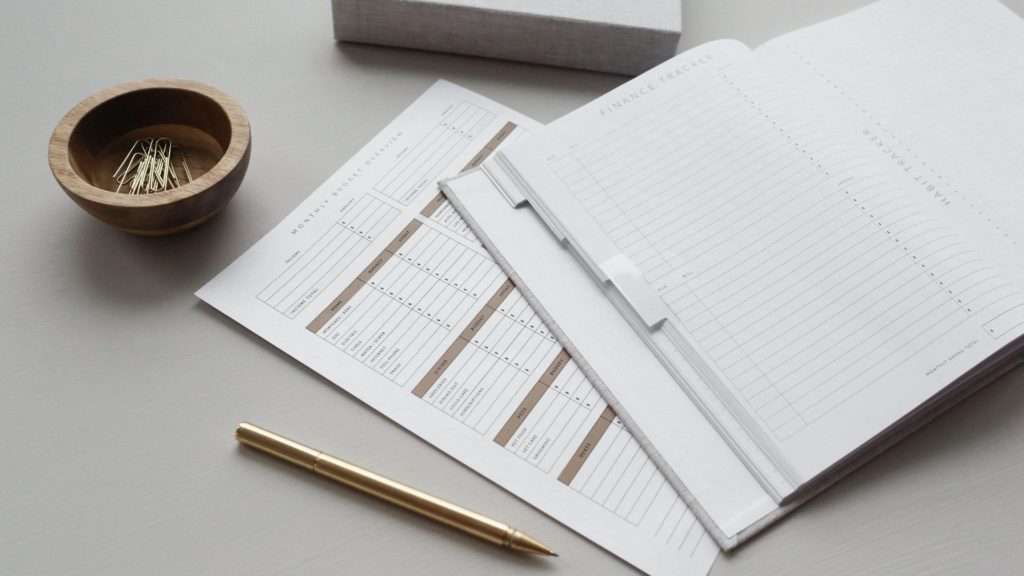
The first thing you need to do is set up a budget for your move. You will want to do everything you can to ensure that you get your security deposit back from your current apartment. If you need additional supplies to do this (paint, handyman fees, etc…), you will need to include this in your budget.
Obviously, you will be including the deposit and rent for the new place. Don’t forget to read the fine print on your new lease. For example, if it is pet-friendly, there may be additional fees. Make sure your renter’s insurance policy covers you until the day you move out and calculate the renter’s insurance for your new place. Next, you will want to budget for the move itself:
- Moving Company Costs
- Moving Insurance – Please note that renter’s insurance does not cover stuff handled by movers.
- Boxes/Supplies
- Moving Company Costs
- Moving Insurance – Please note that renter’s insurance does not cover stuff handled by movers.
- Boxes/Supplies
Tight Budget? DIY. All the Way.
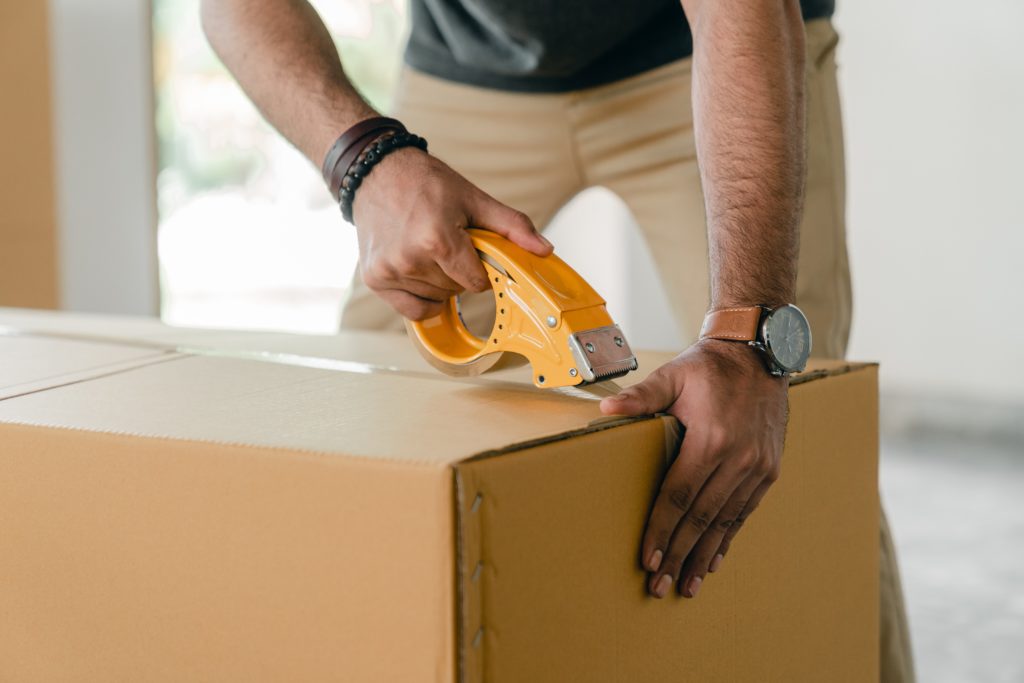
If you are on a tight budget, the best way to move is DIY all the way. This is the time when you find out who your friends really are. You may need to bribe them with the promise of a party once you’ve set up your new place. You will definitely need to provide them with food and beverages on the big day. The hardest part will be coordinating a date that suits everyone.
If you are doing it yourself, don’t forget to get a moving dolly or some type of cart so that you and your friends don’t have to lug your belongings into your new apartment box by box. If your community has elevators, check to see if they have a dedicated moving elevator ahead of time. You may want to call and find out where you can park your U-Haul or trucks during the move. The last thing you want is to get towed.
You will also want to take measurements of your new apartment beforehand. Measure the stairways, doors, and elevators to make sure all your furniture will fit. You will want to do this even if you are not doing it yourself.
Last but not least, don’t overpack your boxes and accidently break one of your friend’s backs. You are also going to want to stock up on the following supplies:
- Cushioning Materials (blankets, sheets, towels, pillows)
- Markers for Labeling Boxes
- Lots of Tape
- Utility Knives
Moving Company
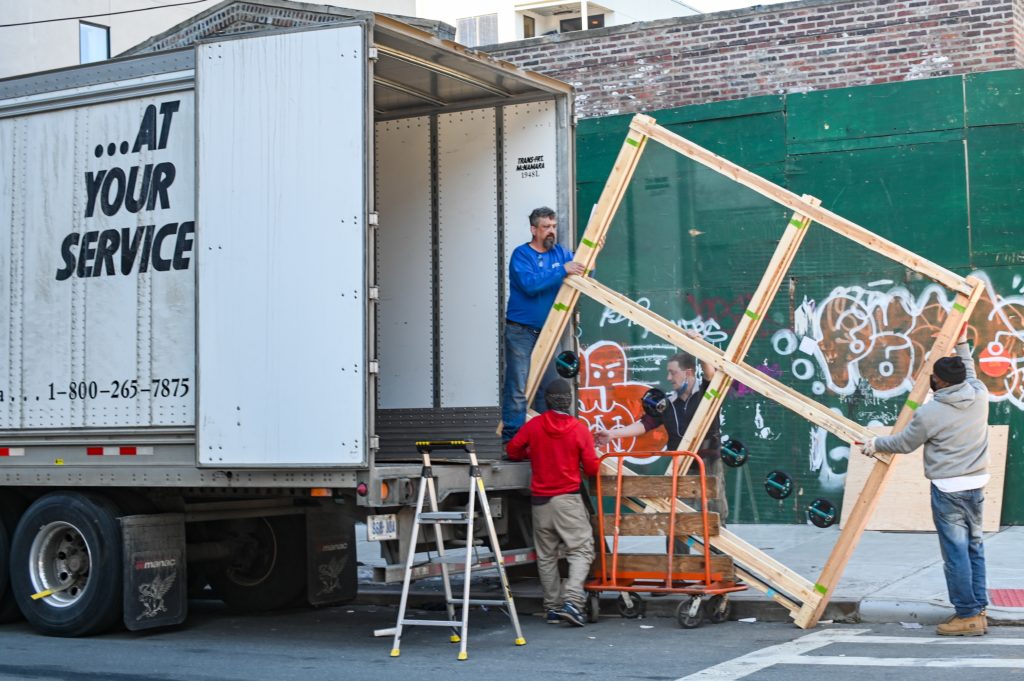
Take your time finding a moving company, the more time you take to search – the better off you will be. Ask your friends and family for recommendations, as well as local real estate professionals. Yelp is also a good place to find reputable moving companies.
Get a few estimates before you make the final decision. Make sure your moving company is licensed and insured by verifying its USDOT (US Department of Transportation) number in the Federal Motor Carrier Safety Administration’s (FMCSA) website. You should be able to find this number on their website, as a professional company will volunteer this information upon request.
Typically, a moving company will base their charges on distance, the average weight and amount of your belongings, the size of your place in terms of how many rooms your apartment has, and finally, the amount of time it will take for the movers to load and unload your things. Make sure they are aware of any additional stops – for example, if you need to stop at a storage unit.
Moving Cost Hacks
It is important to note that the time, day and month of your moving date will affect the cost. Most people move over the weekend and at the beginning or end of the month. The best time to move is in the middle of the month and pick a day during the week instead of the weekend. Make sure you can take the time off work. Ideally, you could do the big move on a Thursday, have Friday off, too. Then you can have the entire weekend to unpack and chill out before work on Monday.
If you book your moving company well in advance, you will not only have your choice of date and time, but you will also have the extra time you need to prepare and pack methodically instead of in a mad rush, as this is when you tend to forget things, making your move way more stressful than it needs to be.
Finally, read over the contract carefully before signing anything and get written confirmation of your moving date and costs, well in advance of the move. For additional peace of mind, call a week before the move and get verbal confirmation as well. If you’ve got a furry friend, make sure someone can look after them for the day.
Once the moving day has been set in stone, it is never too early to start gathering cardboard boxes. If you want to save a few bucks, it’s best to avoid purchasing them. Send out requests on social media asking if anyone has boxes to get rid of and then start collecting them from your local grocery stores, liquor stores, etc. You can never have enough boxes.
Typically, a moving company will base their charges on distance, the average weight and amount of your belongings, the size of your place in terms of how many rooms your apartment has, and finally, the amount of time it will take for the movers to load and unload your things. Make sure they are aware of any additional stops – for example, if you need to stop at a storage unit.
Utilities And Paperwork
After you’ve set your moving date, it is time to start dealing with all the tedious paperwork. It would be a good idea to create folders (physical or digital) – one for your New Home and one for your Current Home – to organize all the paperwork easily. We recommend officially changing your address at the post office and then making sure all current and future utility providers are aware of your move. You want to do these things in advance, as there is nothing worse than being in your new apartment without power, water – or even worse – internet!
Utilities
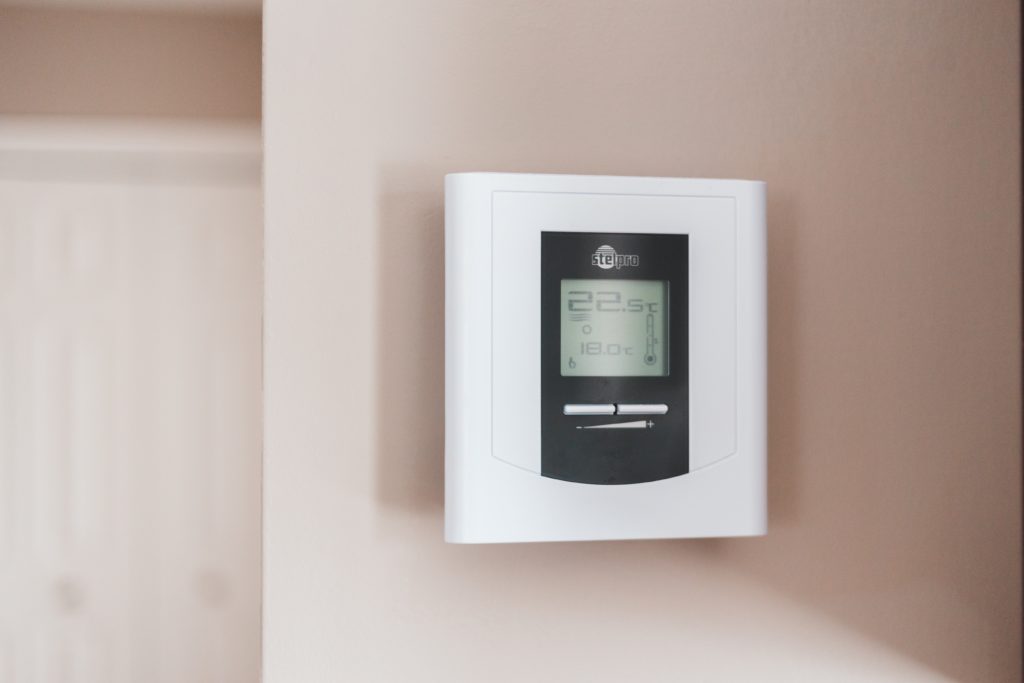
Ideally, you will want the following utility providers to have everything switched over and turned on a day before you move in, and you will also want them taken out of your name at your current rental:
- Internet
- Electricity
- Cable
- Phone
- Gas
- Water
Renter’s Insurance
Don’t forget your renter’s insurance – as many apartment communities require their residents to purchase renter’s insurance. Even if it is not required, it comes in handy should any unexpected misfortunes occur.
Change Your Address
Changing your address at the post office and making sure all mail is forwarded to your new address for at least one month after you move is the first priority. However, it is also important to call or change your address online for the following:
- Bank
- Amazon
- DMV
- Your Employer’s Human Resources Department
- PayPal
- Gym/Yoga/Massage
- Cell Phone Provider
- Credit Card Companies
- Auto Financing
- Doctors/Dentists
- Attorneys
- Insurance
- Accountants
- EBay
- Magazine or other Subscriptions
- Pharmacy
If you have children, now is the time to start registering them into their new schools – if need be. If you have pets, you may want to check to see if you have to register them with the council in your new neighborhood.
Moving to New Jersey from Another State?
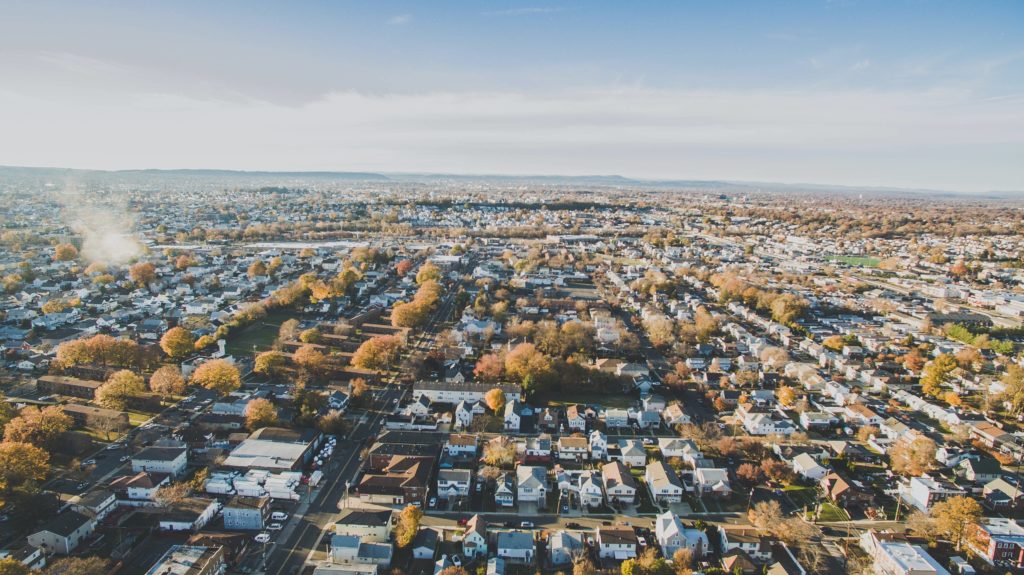
Well, we can’t blame you – New Jersey is a great state to live in. The move doesn’t have to be painful, quite a lot of people make the move from NYC to New Jersey. All the steps listed above are essentially the same. Take the list above and start canceling memberships and hitting the internet and local Facebook groups for recommendations for the new area.
Start with the ones that are the most important – like doctors and cell phone providers, etc. If you are on medication, refill your prescriptions and transfer them to a pharmacy near your new apartment as soon as possible.
Get Ready, Get Set, Start Marie Kondo-ing

At the six-week mark, it is time to start sorting through all your junk and your treasures to figure out what still gives you that special spark of joy. At this stage, you can start to organize your belongings into four separate categories: trash, donate, sell, and pack. You may need to organize a bulk garbage collection. If you are downsizing, now would be the time to look into renting storage units.
Go through every single room – the stuff crammed on the top shelves of your closets, in shoe boxes, and especially the boxes you never unpacked from the last move, and purge. The less stuff you have, the cheaper, faster, and more painless this next move will be. Decide what you want to sell, donate, or throw away. Give yourself time to start listing the sell-able stuff online – and if you have enough time – have an old-fashioned yard or garage sale. You will be surprised how far this will go to bank roll your big move.
If you have quite a bit of stuff to donate, you can arrange for charities like the Salvation Army to pick them up, saving you an extra trip. You will want to do these things ahead of time, as you don’t want to deal with the logistics of getting rid of your excess during the hectic week leading up to your moving day.
Packing: One Room, One Day, One Box at a Time
It may take you a few weeks to get all your paperwork and utilities in order. Hopefully, at this stage, you’re left with what you have to take with you, you’ve collected a bunch of banana and liquor cardboard boxes, and as a bonus, maybe you’ve got a little extra cash from all the stuff you’ve sold.
We recommend that you start packing up your stuff, at the very least, one month ahead of time. If you are working and can’t afford to take time off, you will appreciate the 30 days and nights of doing a little bit at a time.
The very first thing you should do is set aside all valuables, things that are fragile and will require special packing, and all your important documents. Decide what you are going to need with you on the day and what can be packed away. Keep your VALUABLES BOX close by, it will be going next to your ESSENTIALS BOX on moving day.
Moving Hacks
Before you start packing, take pictures of every item that has a high chance of being damaged during the move – this way, you have definitive proof for insurance purposes. You may also want to take a picture of how all your electronics are plugged in, this way you won’t be throwing your TV across the room the night you move in out of frustration.
You may also want to resist buying any new condiments or bulk food until you’ve left the nest. If you are left with an excess of food and it won’t last the journey – donate it to local charities that give food to those that need it.
How do the Master Movers Power Pack?

The pros start packing at least one month before, one room at a time, packing non-essential items first. This means the stuff you don’t use – books, movies, last season’s clothes, the fancy bread maker, or sewing machine that you don’t know how to use but you swear you will one day – pack those first.
Here’s what the Pros Do:
- Wrap all dishware, glassware, breakables, etc. in pillowcases, dish towels, hand towels, sheets, linen etc.
- Before buying bubble wrap or peanut packing, use junk mail, magazines, newspapers, etc., after running out of all possible linen, towels, sheets.
- Put knives away safely wrapped in tea towels or oven mitts.
- Label the boxes clearly with the room it belongs in & number the boxes (keep a written or digital list so you can check once you’ve moved in).
- Never, ever overpack them.
- Pack heavier items in smaller boxes or suitcases.
- Double tape to avoid disaster.
- Stack boxes together according to the room they belong in.
- Hire people to do the exit clean of your old apartment.
- Double tape to avoid disaster.
- Stack boxes together according to the room they belong in.
- Hire people to do the exit clean of your old apartment.
Two to Three Weeks Before Departure Day (D-Day)

At this point, you’ve got all the non-essentials packed. If you are on a tight budget, we’d suggest prepping some meals and freezing them. And adding money into your budget for some cheap take-out, as you are going to be too exhausted to cook or clean up.
If you can, if the move is not across the state or hours away from where you are now, it would be an awesome idea to do a practice run to work during regular work hours – this way you know where you are going and what is the best route to take beforehand. Plus, you can check out where to stop for coffee or a quick bite to eat – there’s nothing worse than not knowing where you are going during rush hour traffic.
Now it’s time to start thinking about what you are going to need for the first 24 to 48 hours in your new apartment. The last thing you are going to want to do is start unpacking and un-stacking boxes looking for your toothbrush and phone charger. You are going to need an ESSENTIALS BOX, and this is what we recommend putting in it:
- Toothbrush
- Toothpaste
- Phone Charger
- Laptop
- Laptop Charger
- Toilet Paper
- Paper Towels
- Change of Clothes
- Shower & Bathing Essentials
- Hand Soap
- Kitchen Soap or Dishwashing Powder/Tabs
- Your Bedding/Pillow/Sheets/Etc.
- Cash to tip your movers & for an emergency (like a pizza delivery)
- Cleaning supplies
A Week Before Moving Day
If you can’t afford an exit cleaner – you need to start cleaning asap. Don’t forget the windows and the ovens – double check the lease, as you may need to get the place professionally carpet cleaned.
You may also want to find out a few things about your new apartment community (if you haven’t already) before you move in. If they don’t have virtual tours online, perhaps they can send you a map or more information regarding the questions below:
- Are there reserved parking spaces or a garage?
- Where is your mailbox?
- If there are community amenities (pool, fitness center, communal lounges), where are they and do they require a key?
- Is there public transportation nearby?
- Where does the garbage and recycling go? You are going to want to know this after you move in – those cardboard boxes will be the bane of your existence if you can’t easily find a way to recycle them.
The Day Before Moving Day
This is what we recommend:
- Remove & detach important pieces of furniture – legs/screws/nuts/bolts – put in durable bag and tape firmly to the item it belongs to
- Electronics: take picture of how it is supposed to be plugged in, unplug cords, and then tape them firmly to the item it belongs to
- Refrigerator: Empty, Clean & Defrost 24 hours before the move. Ensure you have something like towels to soak up the water
- If you can, backup your computer on an external hard drive
- Call Movers again to confirm time, route, and means of communication
- Get your ESSENTIALS & VALUABLES BOXES ready, as they go on the front seat of your car
Moving Day

It’s the big day, let’s just go over a few things again.
- Have you taken pics of your empty new apartment and your empty old apartment?
- Do you have your essential box with water and snacks? Is your valuables box with precious stuff and important docs ready to go on the passenger seat of your car?
- Did you do a final walk-through of your old apartment?
- Are all the windows closed and locked?
- Is the water shut off?
- Is the heater/air conditioner turned off?
- Are all the keys turned in?
- Are all the doors locked and closed?
- Have you checked your list and made sure all your boxes are there?
- If you have enough energy, run yourself a nice bath or take a warm shower, make your bed, pour yourself a glass of wine, and take a well-deserved nap!
New Jersey is a great state to live in and we have luxury-living, apartment communities in some of the most sought-after counties in New Jersey. From Hunterdon County (recently voted the best county to live in in NJ ) to Morris County (voted second best county) to Bergen County (voted fifth best county), Garden Communities has you covered.


